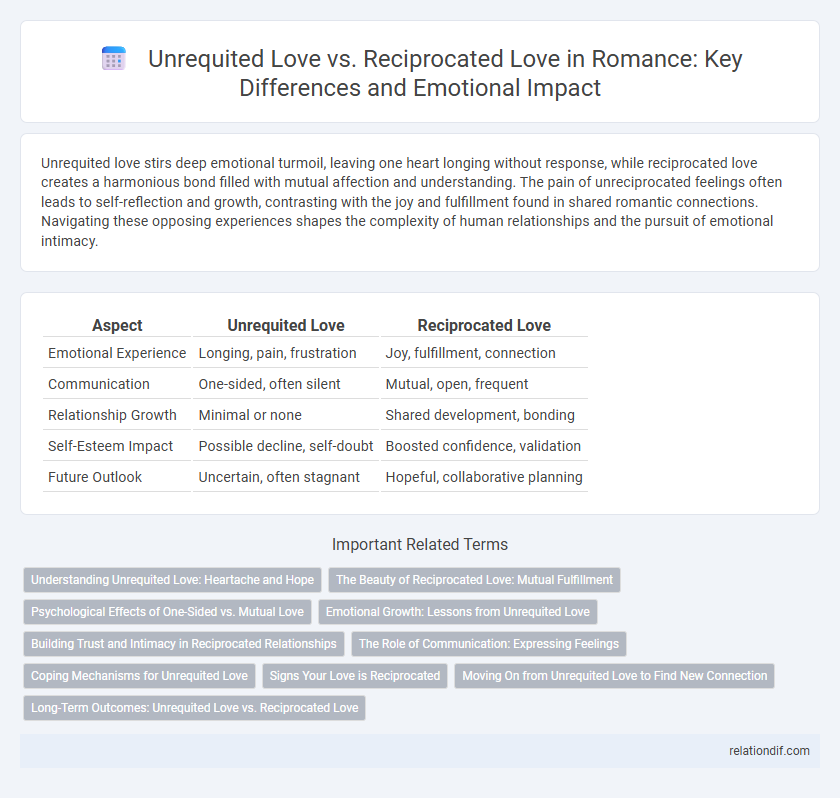Unrequited love stirs deep emotional turmoil, leaving one heart longing without response, while reciprocated love creates a harmonious bond filled with mutual affection and understanding. The pain of unreciprocated feelings often leads to self-reflection and growth, contrasting with the joy and fulfillment found in shared romantic connections. Navigating these opposing experiences shapes the complexity of human relationships and the pursuit of emotional intimacy.
Table of Comparison
| Aspect | Unrequited Love | Reciprocated Love |
|---|---|---|
| Emotional Experience | Longing, pain, frustration | Joy, fulfillment, connection |
| Communication | One-sided, often silent | Mutual, open, frequent |
| Relationship Growth | Minimal or none | Shared development, bonding |
| Self-Esteem Impact | Possible decline, self-doubt | Boosted confidence, validation |
| Future Outlook | Uncertain, often stagnant | Hopeful, collaborative planning |
Understanding Unrequited Love: Heartache and Hope
Unrequited love triggers profound heartache characterized by longing and emotional vulnerability, often leading to personal growth and resilience. The absence of mutual affection fosters introspection and the hope for eventual emotional healing or new romantic opportunities. Understanding these dynamics enhances emotional intelligence and prepares individuals to navigate the complexities of love more effectively.
The Beauty of Reciprocated Love: Mutual Fulfillment
Reciprocated love creates a harmonious bond where both partners experience mutual fulfillment and emotional nourishment, fostering deep trust and lasting connection. Unlike unrequited love, which often leads to heartache and longing, reciprocated love enriches personal growth and shared happiness through balanced affection and support. This mutual emotional exchange enhances relationship satisfaction and builds a resilient foundation for enduring romance.
Psychological Effects of One-Sided vs. Mutual Love
Unrequited love often triggers feelings of rejection, low self-esteem, and emotional turmoil, leading to anxiety and depression due to the lack of reciprocation. Conversely, reciprocated love fosters emotional security, increased happiness, and a stronger sense of self-worth, promoting psychological well-being. Studies in relationship psychology highlight that mutual love enhances oxytocin release, reinforcing bonding and positive mental health outcomes.
Emotional Growth: Lessons from Unrequited Love
Unrequited love cultivates deep emotional resilience by teaching self-awareness and boundaries, unlike reciprocated love which often focuses on mutual happiness. Experiencing unreturned affection prompts introspection and personal growth, encouraging individuals to develop empathy and patience. These lessons build a foundation for healthier, more balanced relationships in the future.
Building Trust and Intimacy in Reciprocated Relationships
Building trust in reciprocated love involves consistent emotional honesty and vulnerability, fostering a safe space for partners to share their true selves. Intimacy deepens as mutual respect and understanding develop through active listening and shared experiences, creating a bond that transcends surface-level affection. Unlike unrequited love, where connection remains one-sided, reciprocated relationships thrive on balanced emotional investment, essential for lasting trust and closeness.
The Role of Communication: Expressing Feelings
Effective communication plays a crucial role in distinguishing unrequited love from reciprocated love by enabling individuals to clearly express emotions and intentions. In reciprocated love, transparent dialogue fosters mutual understanding and emotional connection, reinforcing the bond between partners. Conversely, in unrequited love, lack of open communication often leads to misunderstandings, emotional distance, and unresolved feelings.
Coping Mechanisms for Unrequited Love
Unrequited love often leads to emotional distress, prompting individuals to adopt coping mechanisms such as seeking social support, engaging in self-reflection, and redirecting focus toward personal growth or hobbies. Cognitive reframing techniques help reframe negative thoughts and reduce feelings of rejection, while mindfulness practices promote emotional resilience. Establishing clear boundaries and gradually distancing from the object of affection are essential strategies to facilitate healing and move toward emotional well-being.
Signs Your Love is Reciprocated
Signs your love is reciprocated include consistent communication, genuine interest in your well-being, and physical affection like sustained eye contact or gentle touches. When your partner remembers small details about your life and makes an effort to spend quality time with you, it highlights their emotional investment. Mutual support during difficult times and open, honest conversations further indicate a deep, shared affection.
Moving On from Unrequited Love to Find New Connection
Unrequited love often causes emotional pain and hinders personal growth, making it essential to focus on self-healing and acceptance to move forward. Embracing new opportunities for connection and fostering relationships built on mutual respect and affection increases the likelihood of finding reciprocated love. Cultivating emotional resilience and self-worth strengthens the ability to attract and maintain fulfilling romantic partnerships.
Long-Term Outcomes: Unrequited Love vs. Reciprocated Love
Unrequited love often leads to prolonged emotional distress and lowered self-esteem, negatively impacting mental well-being over time. In contrast, reciprocated love fosters long-term relationship satisfaction, emotional stability, and personal growth. Studies show couples in mutual love exhibit higher resilience against life stressors and greater overall life happiness.
unrequited love vs reciprocated love Infographic

 relationdif.com
relationdif.com